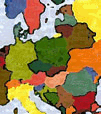Tell us what you think. Post your response here
To the Editor:
Two elections are to occur by the end of October, lighting the darkened path to the future in the Balkans. Slobodan Milošević's presidency is being contested with posts at all levels of government in Yugoslavia on 24 September. The UN will administer local elections in Kosovo on 28 October. Neither election may be free or fair, but the results will still determine a chain of events leading to a decent future in what is left of Yugoslavia, or to more disintegration and despair.
The first election will affect the second. Any win by Milošević will likely bring candidates capitalizing on fear of another decade of the regime to power in Kosovo, as well as a referendum on independence. The international community (of America's allies) would be forced to favor Albanian aspirations or support Serbian claims to Kosovo, inviting all-out war. 90 percent of the non-Albanian population (over 200,000 people) has been driven from Kosovo since 10 June 1999, and most remaining Serbs are boycotting the UN-organized vote.
The level of violence against both the remaining minority communities in Kosovo and Rugova's Democratic League of Kosovo means the vote cannot be free and fair, but it will be held next month anyway. An opposition victory in Yugoslavia might bring more moderate candidates to power in Kosovo, and violent elements may also increase their activities to achieve the amount of fear necessary for their success at the polls. The potential for further disintegration in Southern Serbia is already high, and attentions may turn to Montenegro and Macedonia as Greater Albania emerges, gaining political momentum with a renewal of the Milošević regime's lease on life.
Montenegro in the balance
Montenegro has promised a referendum on independence, should Milošević be victorious. Montenegrin authorities are demanding a boycott of the elections, arguing that they will legitimize the regime's scandalous constitutional changes. The Serbian opposition, which hoped for Montenegro's support, recognizes that the conditions of the elections are oppressive and unfair. But boycott means certain defeat, and any chance for victory must be seized.
Though normally divided and weak, the opposition seems strong and united—even without Drasković's Serbian Renewal Movement, which has been falling to pieces as major local branches have broken ranks to gather behind the opposition candidate. Rival presidential candidates have stepped out of the race, urging support for Kostunica as well.
A future without Milošević
If Milošević gives up his office, many doors in Europe—and places further west—now closed to Belgrade will open. The internal economic blockade against Montenegro would also surely end. Montenegro might remain in the Yugoslav Federation, on new terms with Serbia. Yet even if Montenegro demands independence from a new government in Belgrade, the likelihood of a resulting civil war is remote. Barring such improbability, with Milošević's defeat, Serbia will begin normalization and recovery.
Yugoslavs have been punished in ways ordinary people in the West cannot comprehend. Politicians rest assured that the innocent pay for the madness of statesmen. The average person there is reduced to basic survival mode. The economy is ruined; the markets have turned black. The people are hungry and out of work.
Persistently traumatized by air-raid sirens and NATO bombs, besieged by economic sanctions, degraded by propagandists, sickened by the violence and deceit—the silenced free media, Orwellian realities and the loss of life to politics and war—Yugoslavs are starving for change.
Decisions affecting the fate of millions are normally reserved for agents removed from public influence. These elections, especially the contest for the presidency, are a chance for the people to say for themselves what future they want.
If Milošević stays
If Milošević does not leave office, more will be called into question than the election or Kosovo and Montenegro, all of which are already important enough. Almost everyone expects Milošević to cheat, and almost no one thinks he will give up without a fight if he loses. Maybe there will be a peaceful transfer of power—or none at all.
People may take to the streets if victory is stolen, and it may come to no good at all. But if the people are too tired to resist the regime blatant enough to refuse to lose—or appealing enough to actually win—then Milošević need only fear the betrayal of those closest to him, as the masses will be relevant only as a body to be plundered and abused.
The regime has promised to respect the will of the voters, though the voters' will remains to be measured. If Milošević hangs on to office, the future, for all the right and wrong reasons, will hold more turmoil and violence, and deeper uncertainties that are difficult to resolve. An opposition victory is not instant paradise, but many will breathe a heavy sigh of relief when a new man is named President of Yugoslavia.
The lightened path might nonetheless lead further into darkness. Hovering there as always, the US State Department has insisted that American foreign policy in the Balkans will remain constant whether Gore or Bush wins in November. Should a transfer of power take place in Belgrade, a plausible end will be in sight for the NATO occupation of the former Yugoslavia, with the attentions of the superpower turning elsewhere, to places such as Colombia.
Timothy Hendon, 18 September 2000
Tell us what you think.
Post your response here
Moving on:
- Read past news reviews for Serbia in CER
- Archive of articles on Yugoslavia
- Browse through the CER eBookstore for electronic books
- Buy English-language books on Central and Eastern Europe through CER
- Return to CER front page




